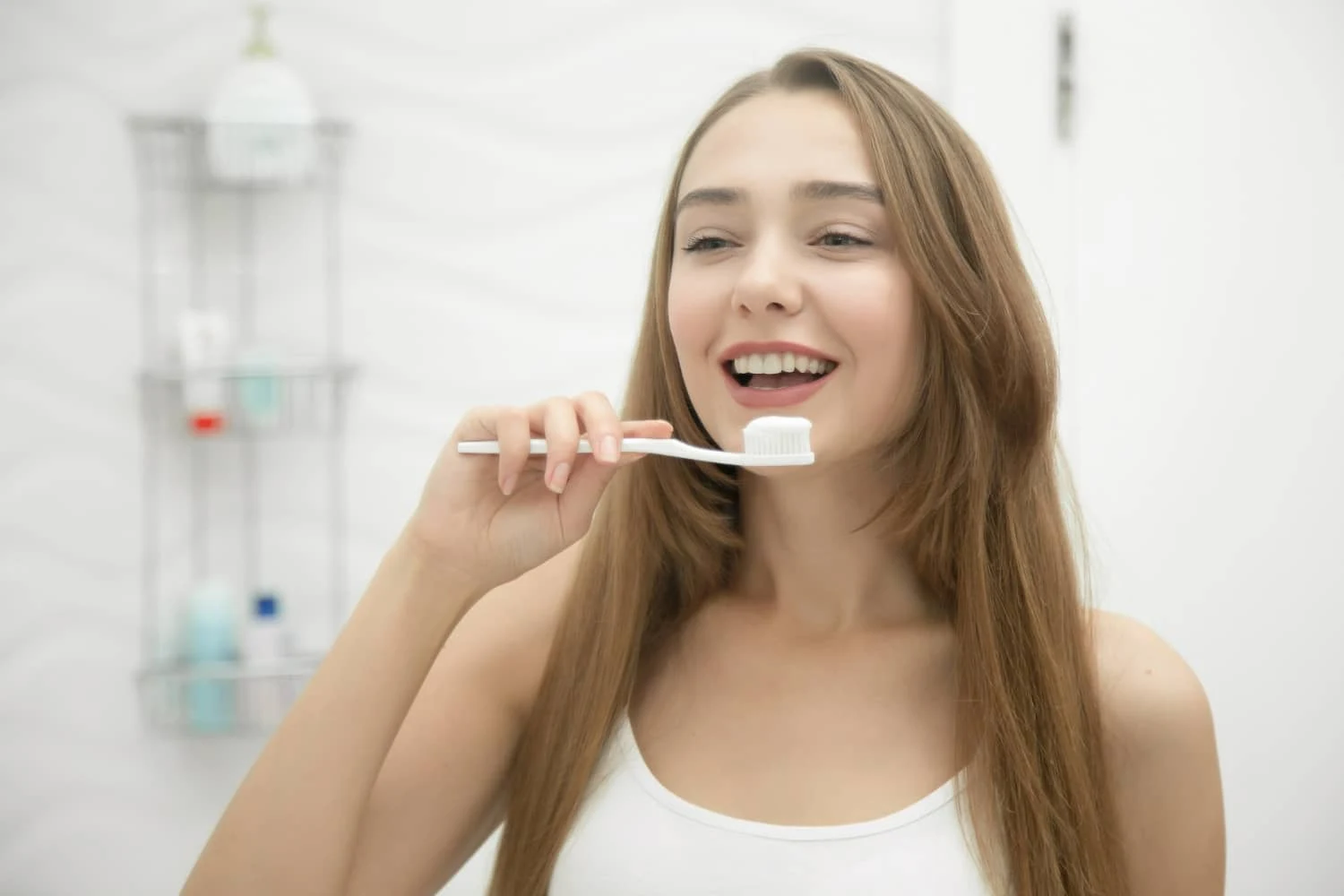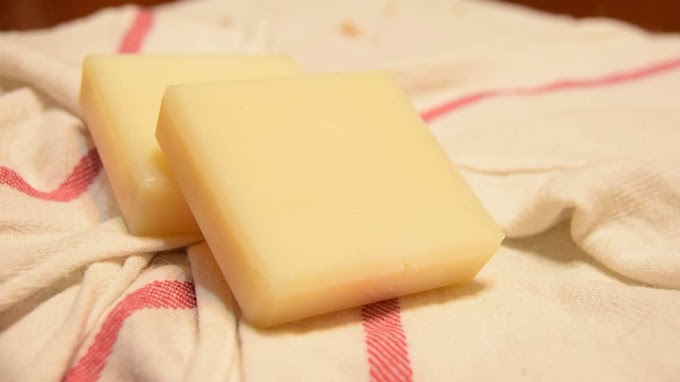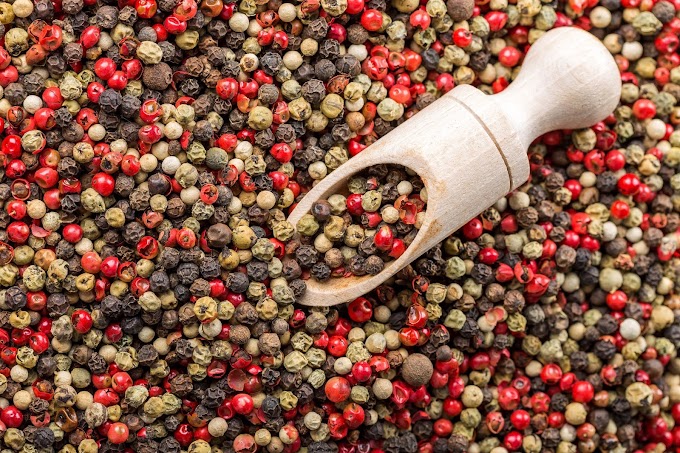.gif) |
| Brushing Teeth With Baking Soda |
Brushing teeth with baking soda? Sounds weird? Well, anything which challenges your common knowledge seems strange. That's psychology for you! The idea of brushing teeth with baking soda is no different! Anyway, we will delve deep into the benefits you might not know along with considerations you need to keep in mind when using baking soda for your oral hygiene.
When it comes to oral hygiene, we're all familiar with the importance of brushing our teeth regularly. It's a daily ritual that not only keeps our smiles bright but also plays a crucial role in maintaining overall dental health. While traditional toothpaste has long been the go-to choice, there's a natural alternative that's been gaining attention for its effectiveness: baking soda!
For me, personally, it's an age-old formula as my aunt (my father's sister), who was an integral part of our joint family, used only baking soda to brush her teeth.
Now, let's assess the advantages of using baking soda for daily brushing.
Relevant article:
Understanding the Benefits of Brushing Teeth With Baking Soda
The benefits of brushing teeth with baking soda can be understood in the context of the below-mentioned properties:
- Whitening Properties
- Neutralizing Acidic Environment
- Antibacterial and Anti-fungal Properties
We shall discuss each of these properties one by one in detail.
A) Whitening Properties:
Baking soda is known for its whitening properties and can help remove stains from the teeth, ultimately restoring your smile's natural brilliance.
Baking soda has a mild abrasive nature, which means it can help scrub away surface stains on the teeth. These stains can be caused by various factors, such as consuming coffee, tea, red wine, or tobacco, as well as the natural aging process.
The good news is that the abrasive particles in baking soda are microscopic in size, making them gentle enough to remove stains without causing significant damage to the tooth enamel. This makes baking soda a milder option compared to some commercial whitening toothpastes that may contain harsher abrasives.
Limitations: While baking soda can be effective in removing surface stains, it may not produce dramatic whitening results for deeper, intrinsic stains that originate from within the tooth structure. In such cases, professional dental treatments like professional teeth whitening procedures may be more appropriate.
It's important to note that using baking soda for teeth whitening should be done in moderation to avoid excessive abrasion. Overuse or aggressive brushing with baking soda may lead to enamel erosion and tooth sensitivity. Consulting with a dental professional before starting any whitening regimen is advisable to ensure it is suitable for your specific oral health needs.
B) Neutralizing Acidic Environment:
Baking soda's alkaline nature allows it to neutralize acidic environments in the mouth, which can help balance oral pH levels. By doing so, it can effectively reduce the risk of tooth decay and enamel erosion. Let's delve deeper into how baking soda achieves this:
Acidic Conditions: The mouth can become acidic due to various factors such as consuming acidic foods and beverages, sugary snacks, and the activity of oral bacteria. Acidic conditions promote the growth of harmful bacteria and contribute to enamel demineralization, leading to tooth decay and erosion.
Alkaline Properties: Baking soda, also known as sodium bicarbonate, has alkaline properties. When it comes into contact with acids, it undergoes a chemical reaction that results in the release of carbon dioxide and water, ultimately neutralizing the acidic environment.
pH Balancing: Oral pH levels indicate the acidity or alkalinity of the mouth. The ideal pH range for maintaining oral health is slightly alkaline, around 7.4. Acidic pH levels below this range can demineralize tooth enamel, making it more susceptible to decay and erosion. Baking soda's alkaline nature helps raise the pH, moving it towards a more neutral and healthier level.
Remineralization Promotion: Baking soda's ability to neutralize acid helps create an environment that is less favorable for the growth of acid-loving bacteria. Additionally, by balancing oral pH, baking soda promotes the remineralization of enamel.
This process allows essential minerals like calcium and phosphate to be deposited back into the tooth structure, strengthening and repairing weakened areas.
Complementary Benefits:
By neutralizing acid and promoting a healthier oral environment, baking soda complements other preventive measures such as regular brushing, flossing, and fluoride use.
It can enhance the effectiveness of fluoride by maintaining an optimal pH level for fluoride uptake and utilization in tooth enamel.
It's important to note that while baking soda can help balance oral pH levels, it should not replace comprehensive oral hygiene practices. Regular brushing, flossing, and routine dental check-ups are essential for maintaining optimal oral health.
By harnessing baking soda's alkaline properties and incorporating it into your oral care routine, you can help neutralize acidic conditions, reduce the risk of tooth decay and enamel erosion, and promote a healthier and more balanced oral environment.
C) Antibacterial and Antifungal Properties:
Baking soda possesses potential antibacterial and antifungal properties, making it a valuable ingredient in combating harmful oral bacteria and preventing common dental issues. Let's explore how baking soda's properties contribute to maintaining oral health:
Inhibiting Bacterial Growth: Research suggests that baking soda has the ability to inhibit the growth of certain harmful bacteria in the mouth. These bacteria can contribute to oral health problems such as tooth decay, gum disease, and bad breath. By reducing bacterial growth, baking soda helps create a healthier oral environment.
Reducing Acid-Producing Bacteria: Baking soda's alkaline nature can also hinder the growth and activity of acid-producing bacteria. These bacteria are responsible for generating acids that attack tooth enamel, leading to decay and erosion. By inhibiting their growth, baking soda helps prevent acid-related damage to the teeth.
Balancing Microbial Flora: The oral cavity naturally contains various microorganisms, including both beneficial and harmful bacteria. Baking soda has the potential to influence the balance of microbial flora in the mouth, favoring the growth of beneficial bacteria while inhibiting harmful ones. This balance contributes to overall oral health.
Fighting Fungal Infections: Baking soda's antifungal properties make it effective against certain fungal infections, such as oral thrush caused by Candida overgrowth. The alkaline environment created by baking soda inhibits the growth of the fungus, helping to control and prevent oral fungal infections.
Reducing Bad Breath: Bacteria in the mouth can produce foul-smelling compounds that contribute to bad breath. Baking soda's antibacterial properties can help combat these bacteria, leading to fresher breath and improved oral hygiene.
It's important to note that while baking soda can play a role in maintaining oral health, it should be used as part of a comprehensive oral hygiene routine. Regular brushing, flossing, and routine dental check-ups are still essential for optimal oral health.
By incorporating baking soda into your oral care routine, you can take advantage of its potent antibacterial and antifungal properties to combat harmful oral bacteria, promote a healthy balance of microbial flora, and contribute to preventing common dental issues.
Proper Usage: Incorporating Baking Soda into Your Dental Routine
Baking Soda as a Standalone Toothpaste:
Baking soda can be used as a standalone toothpaste by creating a simple paste that can be used for regular brushing. Here's a step-by-step guide on how to make and use a baking soda paste:
Obtain Baking Soda: Start by getting a box of baking soda from your local grocery store or supermarket. Make sure it's pure baking soda without any added ingredients.
Prepare the Paste: In a small bowl or container, mix a small amount of baking soda with water to create a paste-like consistency. Start with a ratio of 2 parts baking soda to 1 part water, and adjust as needed to achieve a paste that is not too runny or too thick.
Brushing Technique: Wet your toothbrush bristles and dip them into the baking soda paste. Gently brush your teeth using small circular motions, ensuring that all surfaces of your teeth are covered. Pay attention to your front, back, and chewing surfaces.
Duration and Frequency: Brush your teeth with the baking soda paste for about two minutes, mimicking the recommended brushing time for regular toothpaste. It's generally recommended to brush your teeth at least twice a day, ideally after meals.
Rinse and Clean: After brushing, thoroughly rinse your mouth with water to remove any remaining baking soda residue. You can also use a mouthwash of your choice for added freshness, if desired.
Additional Considerations:
Avoid swallowing the baking soda paste as it can cause stomach upset.
If you experience any irritation or discomfort while using the baking soda paste, discontinue use and consult with a dental professional.
It's important to note that using baking soda as a standalone toothpaste may not provide the same level of fluoride protection as fluoride-containing toothpaste. Therefore, it's recommended to alternate the use of baking soda paste with fluoride toothpaste or consult with a dentist for personalized advice.
Using a baking soda paste for regular brushing can be a cost-effective and natural option to maintain oral hygiene. However, it's essential to use it responsibly and in moderation.
Remember to consult with a dental professional for personalized guidance and to ensure you're taking appropriate care of your oral health.
FAQs
Can brushing with baking soda whiten teeth?
Baking soda can indeed be used for brushing teeth because it creates an alkaline solution when mixed with water. This alkaline environment promotes the release of free radicals, which aid in breaking up plaque and surface stains on the teeth.
Furthermore, baking soda proves to be an effective treatment for mouth ulcers. It also helps freshen bad breath by neutralizing acids produced by lingering food particles.
Does brushing with baking soda damage teeth?
Brushing your teeth with baking soda once a day or occasionally is not harmful to your teeth. However, excessive or aggressive brushing with baking soda can potentially damage the tooth enamel.
It's worth noting that some individuals mix baking soda with lemon juice, strawberries, or other ingredients for tooth-cleaning purposes. While this method can be effective on occasion, it's advisable to use it sparingly to prevent tooth damage, as recommended by family dentists.
Is baking soda safe to brush teeth?
Yes, baking soda is generally safe for brushing teeth when used in moderation. Its mild abrasive properties can help remove surface stains and promote oral hygiene. However, excessive or aggressive brushing with baking soda can potentially lead to enamel erosion.
Individuals with sensitive teeth or existing dental conditions should consult with a dentist before using baking soda as a toothpaste alternative. It's important to maintain a balanced oral care routine with regular brushing, flossing, and dental check-ups to ensure optimal oral health.
How fast does baking soda whiten teeth?
The speed at which baking soda can whiten teeth may vary depending on individual factors such as the severity of stains and consistent usage. Baking soda's mild abrasive nature can help remove surface stains over time. However, it may take several weeks or even months of regular use to notice significant whitening effects.
It's important to remember that baking soda may be more effective in removing extrinsic stains caused by external factors like food and beverages, rather than intrinsic stains that are deeply embedded in the tooth structure. Consulting with a dental professional can provide personalized guidance on teeth whitening options.
Is it good to brush your gums with baking soda?
While baking soda can be used for brushing teeth, it is generally not recommended to brush your gums with baking soda. Baking soda is abrasive and can potentially irritate the delicate gum tissue, leading to discomfort or damage. It's best to focus on gently brushing your teeth and along the gumline, using a soft-bristled toothbrush.
What are the disadvantages of baking soda toothpaste?
While baking soda toothpaste offers several benefits, there are a few potential disadvantages to consider. First, baking soda is mildly abrasive, so excessive or aggressive use may lead to enamel erosion over time.
Additionally, baking soda does not contain fluoride, which is important for strengthening tooth enamel and preventing tooth decay. Therefore, relying solely on baking soda toothpaste may increase the risk of cavities. Lastly, some individuals may find the taste or texture of baking soda paste unpleasant.
It's recommended to use baking soda toothpaste in moderation and consult with a dentist for personalized advice on oral care products.
What does it feel and taste like to brush with baking soda?
 |
| Brushing Teeth With Baking Soda |
For those who are new to brushing with baking soda, the texture, and sensation may come as a surprise. When used with water alone, it can feel gritty and leave an undesirable aftertaste. To overcome this, some individuals choose to mix baking soda with toothpaste or add flavors like peppermint to enhance the experience.
However, it's important to note that certain additions, such as vinegar, can further contribute to the unpleasant taste. While the initial experience may not be enjoyable, it is possible to combine baking soda with other ingredients to improve both the feel and taste in the mouth.
Is it better to use baking soda rather than toothpaste?
Using toothpaste regularly is recommended as baking soda alone lacks the ability to combat cavities. Moreover, excessive use of baking soda may harm the teeth. While cautious and mindful use of baking soda can offer benefits, it should not serve as a permanent substitute for quality toothpaste.
How often is it OK to use baking soda to brush teeth?
One can brush with baking soda once a day and use fluoride-based toothpaste for additional brushing. One must brush teeth at least twice a day.
Conclusion
Incorporating baking soda into your dental routine offers a natural and potentially effective way to maintain optimal oral health. From its teeth-whitening properties to its ability to neutralize acidity and fight harmful bacteria, baking soda has become a popular choice for those seeking a natural alternative to traditional toothpaste.
However, it's crucial to approach the use of baking soda with knowledge and caution. While the evidence suggests its benefits, sensitivity concerns and moderation are key. It's always advisable to consult with a dental professional for personalized advice tailored to your specific oral health needs.
So, whether you're looking for a natural teeth-whitening solution, an effective solution for plague removal, or seeking to balance your oral pH levels, consider harnessing the power of baking soda. By understanding its benefits, proper usage, and potential precautions, you can make an informed decision about incorporating this remarkable home remedy into your oral care routine.
Remember, a healthy smile is a lifelong asset, and with the right knowledge and approach, brushing your teeth with baking soda may just be the key to unlocking its full potential.
Happy smile to you! :)
You may also like:
11 Simple Tricks to Reduce Anxiety in The Covid19 Era
10 (Hidden) Benefits of Running a Mile a Day in 2023
5 Compelling Benefits of Sports For Your Child
Rare & Mystical Hanuman Chalisa Video | Magical Benefits of Hanuman Chalisa Explained
Share This Article
If you enjoyed reading this post, you can thank me by leaving a comment below and sharing it with your family and, friends!
Disclosure: This content is reader-supported, which means if you click on some of the links and buy a product/service, we may earn a commission at no extra cost to you! Full disclosure here.
Disclaimer:
The content is purely informative and educational in nature and should not be construed as medical advice. Please use the content only in consultation with an appropriate certified medical or healthcare professional.











.webp)
![Top 200 [MALE] Names in the 1800s in the USA](https://blogger.googleusercontent.com/img/b/R29vZ2xl/AVvXsEg95FuQcE9OEggwGe1_ejEsdnEfQ5fNFhtVsaoNV76fLU0XFY2xyyQ8kVT8EBhru7H-4bZDwBRo4qXXPXsVrPUxz3cCqV7_NbU_1q8tjdV3IyEwUFXrl_H97MQCNg_NgvEdxPlOrGKxvc_vbpcdY-gUIV5hy5FElKIxy2Qsp1e6EIsu9rNW5T-6SrfqbtQ/w680/names%20in%20the%201800s%20(1).png)



.png)